Key takeaways:
- Genealogical roadblocks, such as missing records and conflicting information, can hinder research but are common challenges faced by many.
- Engaging in genealogy fosters a sense of belonging and connection to family history, enriching relationships and personal identity.
- Strategies to overcome obstacles include expanding search areas, collaborating with others, and revisiting existing records for new insights.
- Embracing patience and collaboration in genealogy can lead to unexpected breakthroughs and a deeper understanding of one’s family narrative.
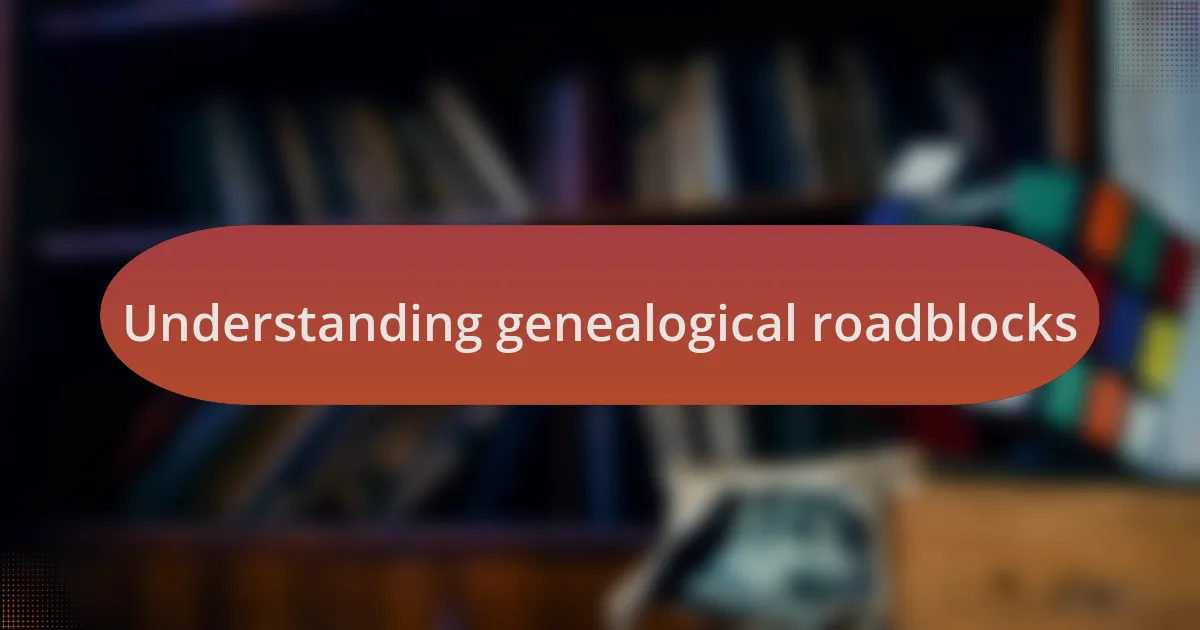
Understanding genealogical roadblocks
Genealogical roadblocks can often feel like walls that close in on your research journey. I remember when I hit a brick wall searching for my great-grandfather’s immigration records; it was frustrating. It makes you wonder, how many stories are left untold simply because of missing documents or gaps in data?
One of the most common obstacles is conflicting information. I experienced this firsthand when two different family trees on the same online platform listed entirely different birth years for my ancestor. It leaves you questioning which path to believe and how to reconcile these discrepancies, doesn’t it?
Another challenge comes from documentation loss, especially when dealing with historical events like wars or natural disasters. I vividly recall sifting through archives only to find that the records I needed had been destroyed. It’s moments like these that test your resilience and spark a sense of urgency to uncover your family’s narrative.
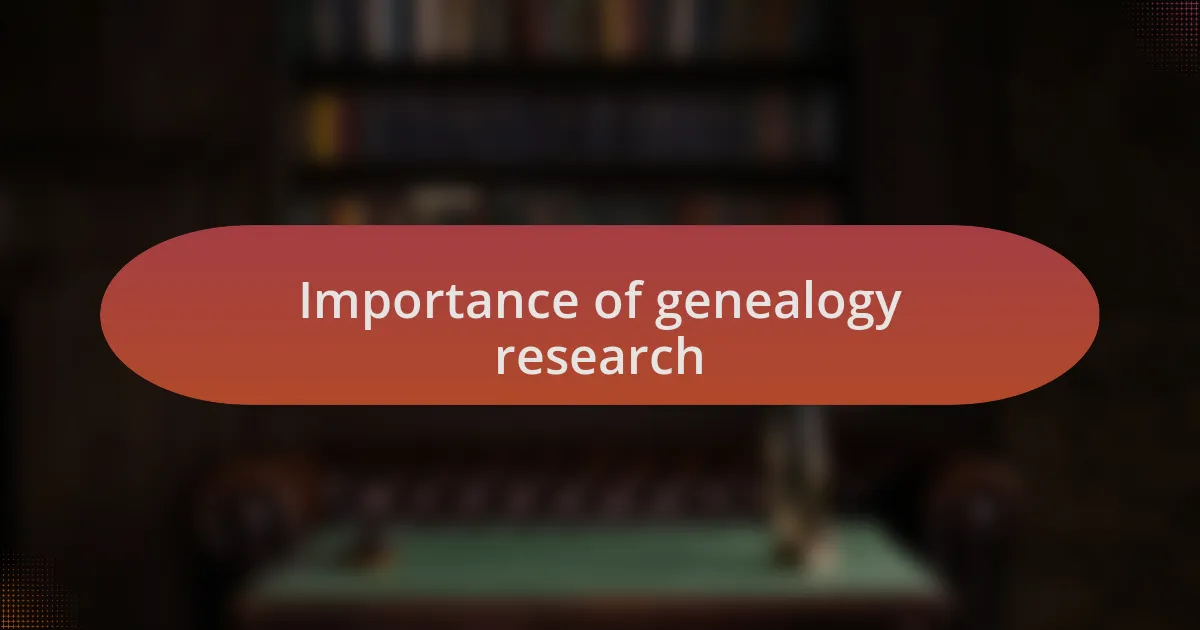
Importance of genealogy research
Genealogy research holds immense importance, as it connects us to our roots and helps us understand our identity. When I first dove into my family’s history, I felt a deep sense of fulfillment as I uncovered stories of resilience and strength that shaped who I am today. It makes me ponder: without this exploration, how can we truly appreciate the sacrifices and achievements of those who came before us?
Moreover, gathering genealogical information fosters a sense of belonging. I remember a family gathering where I shared newfound details about our ancestry. The amazement and pride on my relatives’ faces reminded me that these stories not only enrich our knowledge but also enhance our relationships. Isn’t it incredible how knowing where we come from can bring us closer to our loved ones?
Engaging in genealogy research can also provide broader historical context, making us realize how societal events impacted our ancestors’ lives. Reflecting on my findings, I discovered how the Great Depression profoundly influenced my grandparents’ decisions. These revelations prompt essential questions about how history intertwines with our personal narratives—how can we ignore the legacies of our past and still navigate the present?
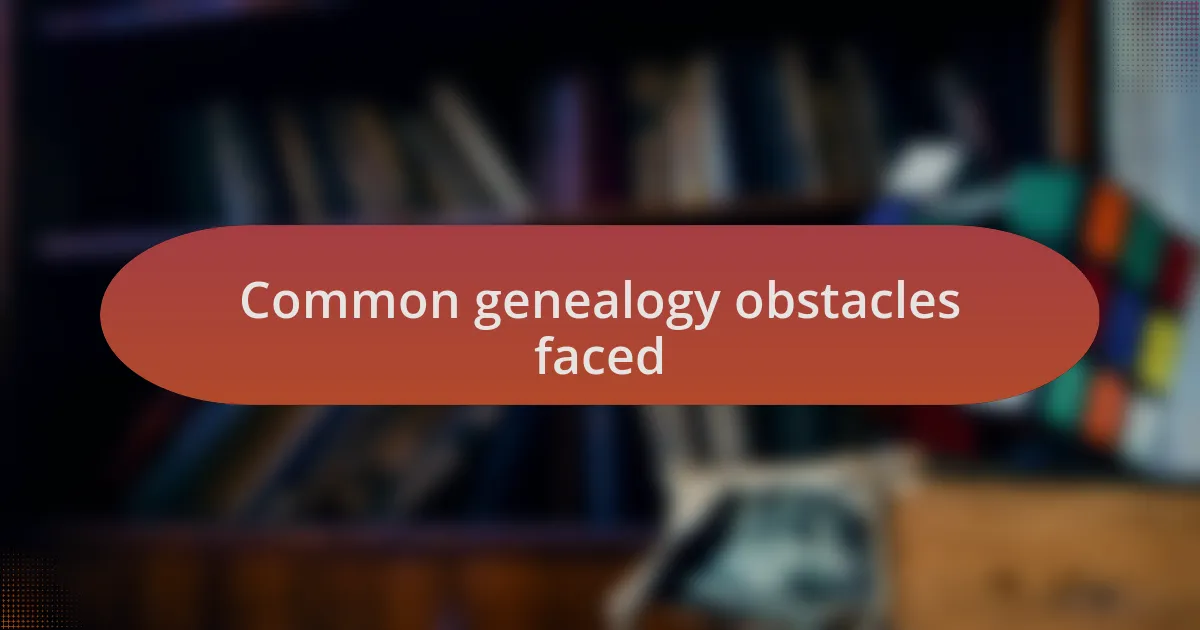
Common genealogy obstacles faced
Researching my family history, I quickly encountered the frustration of missing records. I remember a moment when I hit a brick wall while searching for my great-grandfather’s immigration papers. It was disheartening to find gaps where I expected clarity, leaving me to wonder: how do you fill in the pieces when the evidence is just not there?
Another common roadblock I faced was deciphering old documents written in cursive or foreign languages. I can’t tell you how many times I painstakingly tried to read my ancestors’ marriage certificates, squinting through the haze of faded ink. Have you ever felt the joy of finally deciphering a long-lost name only to realize it was spelled in an unfamiliar way? That moment of triumph is often mixed with the frustration of having to rethink everything I thought I knew.
Navigating family dynamics presents yet another challenge. I’ve encountered relatives who are protective of family stories, reluctant to share details that might change our perceived history. It makes me question: why do we cling so tightly to certain narratives? In my own experience, opening up about my findings led to some unexpected conversations, revealing family secrets and expanding my understanding. It’s a delicate balance between respect for privacy and the quest for truth.
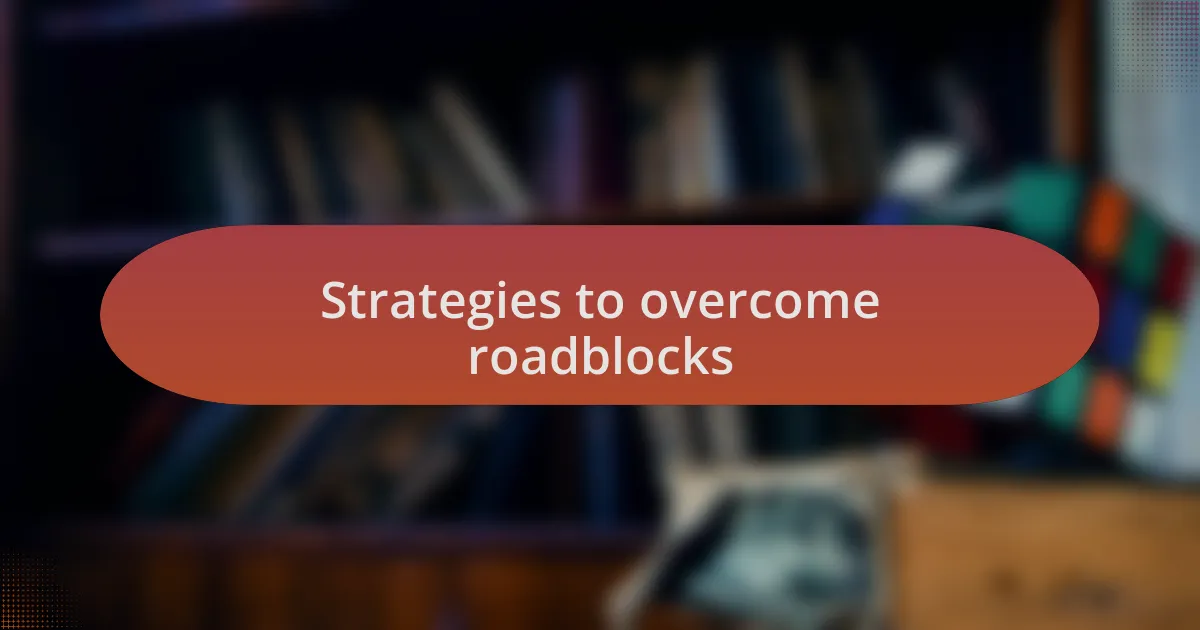
Strategies to overcome roadblocks
One effective strategy I’ve embraced is to expand my search radius. When I hit a dead end with one branch of my family tree, I often turn my attention to neighboring towns or states where relatives might have moved. For instance, I once found vital records in a nearby county that provided the missing link to my great-grandmother. Have you tried exploring areas beyond your immediate focus? It could reveal surprises waiting just around the corner.
Joining genealogy groups has been another game-changer for me. Connecting with fellow enthusiasts often opens doors I hadn’t thought to knock on. I recall a moment when a post about my great-grandfather in an online forum led to a distant cousin reaching out with a wealth of information. Sharing experiences and tips makes the journey feel less lonely and incredibly enriching. Have you considered that collaboration could lead to breakthroughs you’ve been searching for?
Additionally, revisiting my existing records with fresh eyes can unlock new insights. Sometimes, I find that a second look at an old document—perhaps with a different mindset or a new tool—can unravel a thread I previously overlooked. This happened when I re-examined a family photograph, realizing a small detail revealed the year my great-uncle emigrated. Encouraging self-reflection, have you thought about how a different perspective might alter your research narrative?
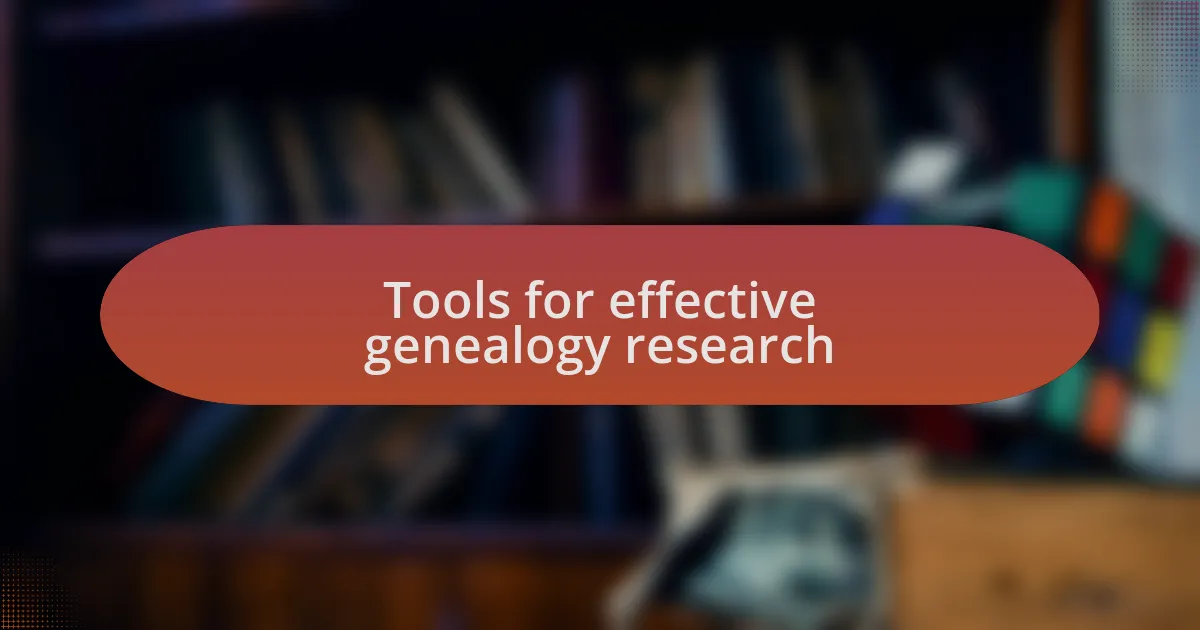
Tools for effective genealogy research
When it comes to genealogy research, technology has been a real lifeline for me. Online databases, like Ancestry and FamilySearch, have become my go-to tools. I remember when I utilized these platforms to uncover a range of census records that revealed my grandmother’s entire childhood address history. Have you explored these databases yet? They can be a treasure trove if you know where to look.
Another invaluable tool I’ve found is mapping software. By plotting my ancestors’ locations, I can visualize migration patterns and discover where families may have intersected. One time, I used mapping software to trace my grandfather’s path from Italy to America, and the journey came to life in a way that mere names on a page never could. Have you thought about how visual aids can enhance your understanding of your ancestors’ lives?
Lastly, don’t underestimate the power of historical newspapers and local archives. I’ll never forget the thrill I felt when I stumbled upon my great-grandfather’s obituary tucked away in a 1930s newspaper. The details painted a vivid picture of his life that I had never known. Have you delved into archives or newspaper databases? You might uncover stories that breathe life into those branches on your family tree.
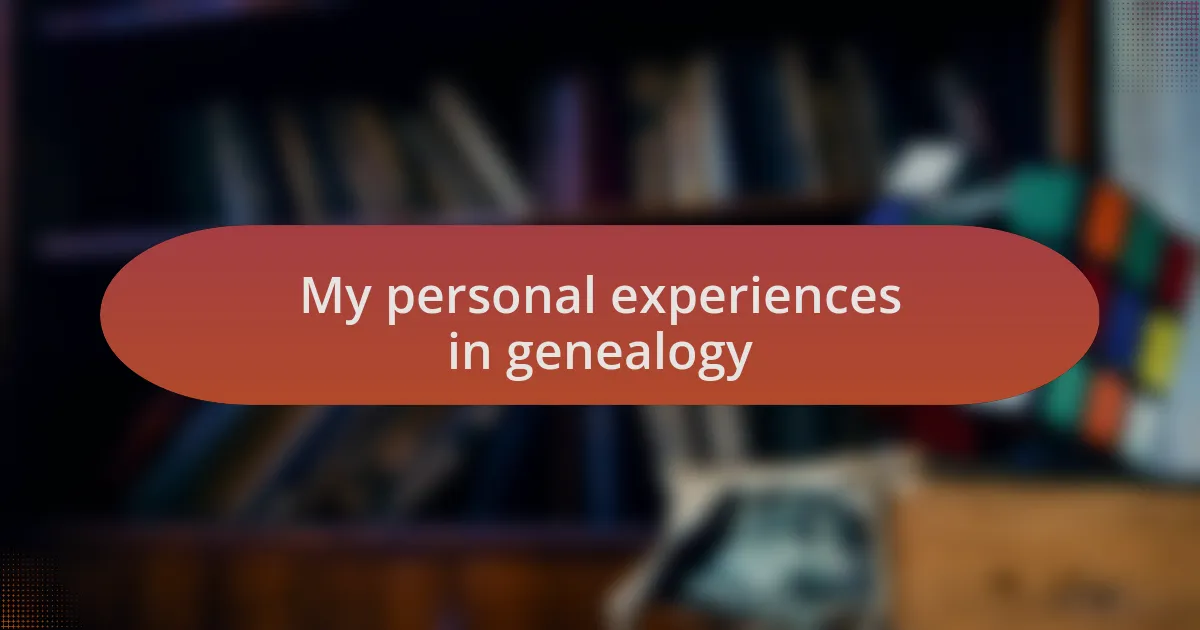
My personal experiences in genealogy
There’s a certain magic in connecting with my ancestors through documents and stories. One of my most rewarding experiences was discovering a faded letter from my great-aunt that described her journey across the ocean. Reading her words felt like having a direct conversation with her, fostering a deep emotional bond despite the decades that separated us. Have you come across anything similar that brought your family history to life?
As I navigated through my research, I encountered roadblocks that initially felt insurmountable. I struggled for months to find information about my paternal line until I decided to connect with distant relatives through social media platforms. To my surprise, a fourth cousin reached out, leading me to a wealth of shared documents and family stories that reignited my passion for genealogy. Isn’t it amazing how a simple digital connection can break down years of barriers?
Dealing with genealogical mysteries can be frustrating, but I’ve learned that persistence pays off. There was a time I hit a wall with my grandfather’s wartime records. After countless hours of searching, I finally reached out to a historical society, and they were more than willing to assist. Their guidance revealed not just facts but also personal stories that transformed my understanding of my grandfather’s experiences. How do you approach those frustrating moments in your research?

Lessons learned from my journey
One significant lesson I learned is the importance of patience. There were days when I felt defeated and questioned whether I’d ever uncover the truth about my family’s lineage. I remember one particular instance when I spent an entire weekend sifting through online databases, only to come up empty-handed. Yet, taking breaks and stepping away from the screen often led me to unexpected breakthroughs when I returned with a refreshed perspective. Have you ever noticed how a little time away can spark new ideas?
Through my journey, I realized the value of collaboration in genealogy. Initially, I viewed family research as a solitary endeavor, but that changed when I joined a local genealogy group. Sharing challenges and successes with others not only provided me with fresh insights but also introduced me to new resources I hadn’t considered. One member generously shared his experience with a challenging ancestor, which ultimately guided me to uncover secret documents in my own family history. Isn’t it fascinating how much more progress we can make when we learn from one another?
Lastly, I’ve learned to embrace the unpredictability of genealogy. There were times when I thought I was on the right path, only to discover that I’d followed a misleading trail. In one instance, I was elated to connect with what I thought was a lost ancestor, only to later find that the connection wasn’t as solid as I hoped. This taught me that every twist in the journey contributes to my understanding of my family’s story, even if the answers aren’t what I originally expected. How has embracing uncertainty shaped your own research journey?